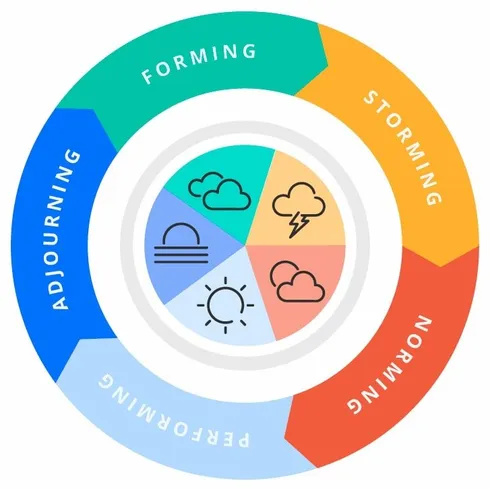Like children growing up to become adults through various stages of development, teams also mature through various development stages to transform into strong high performing teams within a strong organisation. As the team develops, they may go through spikes of highs and lows and may encounter some disagreements to understand how each member works within the team. Once the team becomes familiar with how each person works, the entire team can move towards positive action and success for the project or business.
Hiring a group of talented people doesn’t mean that they will form a great team. If teams are not provided with the right environment and leadership, teams can become stagnant, ineffective and do not mature properly into high performing teams.
Here we explain the stages of development formed by a psychologist named Bruce Tuckman. The 5 stages are forming, storming, norming, performing and adjourning. Understanding Tuckman’s development process can increase your chances of reaching project and business goal(s).
- Forming Stage
In this stage, the various team members test the waters to know what kind of behaviour will be accepted within the group. The members express the need to have a common agreement on the purpose of the team. It also involves setting up the initial goals and determine the basic ground rules. During this phase, the team members look up to the leader for recommendations. This phase is similar to what children express related to orientation and dependency during the initial days. During this stage, the group usually exhibits its best behaviour. - Storming Stage
In this stage, there is usually conflict amount the team members. The risk is the highest for disillusionment. Although there are teams that never go through this stage, it is best not to avoid it. Although there might be challenges, still things can be constructively managed, leading to team members learning how to handle differences. - Norming Stage
Team members gradually learn how to keep aside differences and focus on work. The problem is that team members could be so focused on averting conflicts that they may not be willing to share anything controversial. Search informal and competitive environment might limit the members from questioning prevailing methods. - Performing Stage
This is the pay-off off stage for the hard work done by the team. What initially began as a group of individuals has now become a team. The team members can handle every situation professionally and produce meaningful outcomes. - Adjourning Stage
The fifth stage of Tuckman’s development sequence is the adjourning phase. The adjourning phase assumes that once the team’s mission is accomplished, the team itself dissolves but team members often find it difficult to separate from they team that they’ve formed close bonds. This is particularly relevant for teams that are hired for project work.






